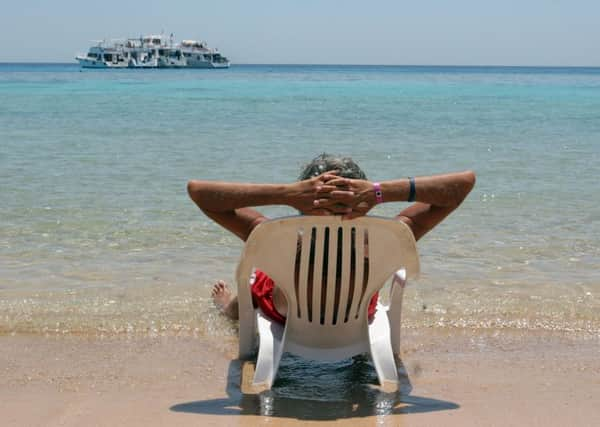Lori Anderson: A lump sum or time off from work?


I can’t be the only one of a certain age who likes to pack to the crunch of jackboots. Rat-faced Johnny Rotten’s anthemic cathedral of sound, Holidays in the Sun, is my audio pepto-bismol for the nausea and stress that overcomes me when packing a suitcase for a trip. I have no idea what I will want to wear a week on Tuesday when I have no inkling if it will be 80 degrees (see earlier note re certain age) or bucketing down with rain.
My holidays are never ever disappointing because of the gospel according to Johnny: “A cheap holiday in other people’s misery.” Those words stay with me. It’s best to go away with that mindset, your holiday may end up being the equivalent of going to see your favourite band, securing a place down front and having some neanderthal rain down a pint of lager on you.
Advertisement
Hide AdAdvertisement
Hide AdWe are contentedly sliding into the summer season of sun-screen, floppy hats and flip-flops, a time when distant beaches begin their siren call and have us drowsily drift towards them. The Sex Pistol’s Holidays in the Sun was inspired by the band’s unsuccessful trip to the island of Jersey, where their notoriety ensured their swift eviction and so they decided to escape their growing fame and head to Berlin. Johnny Rotten is the Satanic twin to Cliff Richard cutely crooning how “we’re all going on a summer holiday”.
If we in Europe are indeed all going on a summer holiday then there are some of us going more frequently than others. A debate has recently broken out in France over their motto “les vacances, c’est sacre!” for the French energy giant EDF is exploring just how sacred their employees view their annual vacations.
The reason is that EDF staff have so many of them. The company’s 30,000 full-time staff are entitled to a lazily luxuriant ten weeks off each year which means while taking the whole of August off, as many French employees do, they still have six weeks left to sprinkle around the rest of the year, though a dollop often goes on taking most of May off too, a month reduced to an emmental cheese by public holidays on the 1st, 8th, 14th and 25th. The company’s group strategy executive is concerned that EDF is losing productivity and said: “We cannot be out of step with the world.” In an attempt to persuade staff to agree to a cut in annual holidays from ten weeks to just over six weeks (27 days) management are offering them a one-off payment of €10,000 (£7,200) or a pay rise of 6-7 per cent.
The question many staff will be asking themselves is whether a single week’s holiday is worth more than the €2,500 value that EDF has placed on it.
I’d argue that the price is too low and that staff would be wiser to hang on to a perk that once lost can never be regained. For while staff at EDF enjoy twice the number of paid holidays as the average British employee, they have serious competition in the form of certain employees in Austria where workers can enjoy 25 days holiday plus 13 days public holidays with the added bonus that they are paid a “13th month” bonus at the time of their summer vacation. In effect, they are not only paid while on holiday but while relaxing on the beach they are on the equivalent of “double time”. At the other end of the scale is China, where only five days holiday is common for workers.
It was the Bank Holiday Act of 1871 that finally ensured that British workers would be paid on those days off and in 1939 legislation ensured that everyone was guaranteed at least one week of paid holiday per year.
The health benefits of a holiday in the sun are now quantifiable according to a recent study by the Holiday Health Experiment which conducted biometric testing on a group of workers, one of which went on vacation while the other, like the little piggy, stayed at home. According to the results those who enjoyed a two-week break reported a 6 per cent drop in blood pressure, a 17 per cent improvement in sleep quality and showed an improvement of 27 per cent on a stress-resilience test. It should be noted, however, that the research was partly funded by Kuoni, the travel operator who specialised in two-week holidays on golden sands. Had the research not been so positive I’m sure it may have been quietly slipped into the bin, for holidays, as we all know too well, come with their own challenges. A separate study found that women were 23 per cent more likely than men to get stressed while planning and packing for a trip while men were 19 per cent more likely to come back from a holiday stressed, though hopefully not from a Kuoni holiday.
EDF will now have to wait and see if its plan to buy out staff’s holidays is successful or if the majority will be content to forego gold today, in the form of a lump sum, for an extra month of golden days every year until they retire.
I wonder how many will opt to take the money and save it for a rainy day?